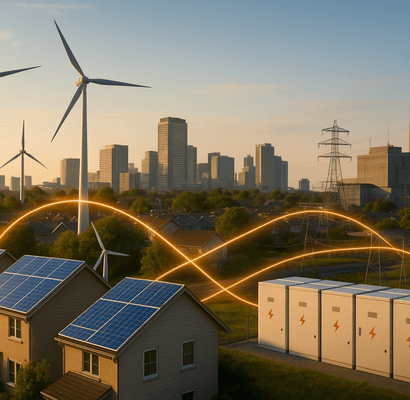Smart grid technology is changing how electricity moves across cities and towns. It allows energy to flow in two directions, helping power companies balance supply and demand in real time.
In this guide, we explain what a smart grid is, where smart grid applications are used, and which skills are in demand. We also look at how digital power grids impact hiring, and why companies turn to grid recruitment specialists to find qualified people fast.
What Is a Smart Grid?
A smart grid is a power network that uses digital systems to manage how electricity is generated, delivered, and used. It replaces manual controls with sensors, software, and remote monitoring tools.
In a traditional grid, power moves one way - from the power station to the user. In a smart grid, energy can also move back from homes, battery storage, or solar farms to the network. This makes the system more flexible and efficient.
Key features of a digital power grid include:
- Sensors that track energy use in real time
- Remote-control systems for grid assets
- Data-driven fault detection
- Integration of renewable energy sources
- Two-way communication between suppliers and users
Where Are Smart Grid Applications Used?
Smart grid applications are now used in homes, factories, and large utility networks. Each setting benefits from the ability to monitor and adjust energy use quickly.
In residential areas
Smart meters track usage every 30 minutes. This allows suppliers to bill accurately and helps users lower energy bills.
In commercial and industrial sites
Sensors detect usage patterns and spot system faults early. This reduces downtime and saves money.
For example, a logistics firm in Manchester saved 18% on its energy costs by installing a smart grid-enabled monitoring system. The company used real-time data to adjust operations based on peak demand pricing.
On the national grid
Digital tools help manage large power flows and keep the system stable when demand changes. Wind, solar, and battery assets are added and removed automatically using grid software.
Why Smart Grids Need Skilled People
Smart grids work with both hardware and software. This means employers need a mix of technical, digital, and analytical skills to build and manage them.
Common roles in grid recruitment include:
- Grid engineers with SCADA or RTU knowledge
- Data analysts for real-time monitoring
- Control room operators with HV switching training
- Cybersecurity experts for grid software protection
Grid recruiters often look for people with hands-on experience plus extra skills in automation or data analysis. A technician who can read SCADA logs and adjust remote voltage controls is much more valuable than one who only handles cables.
What Skills Support a Career in Smart Grid Technology?
If you're hiring or entering the sector, these skills matter:
Electrical knowledge
Engineers should understand 11kV and 33kV systems, fault levels, and power flow modelling. NVQ Level 3 or higher is expected for most field roles.
IT and data handling
People working on smart grids often use digital platforms. Skills in data logging, analytics, and cloud platforms (like AWS or Azure) help teams react faster to site issues.
Safety and compliance
Working on live grids requires training in health and safety standards like NERS or DNO site rules. Many roles also require G99/G100 knowledge for grid connections.
How is Grid Recruitment Evolving?
As digital power grids grow, companies are changing how they hire. Many now work with grid recruiters who understand both electrical systems and digital platforms.
For example, a utilities contractor in the Midlands used a specialist recruiter to fill five grid roles in four weeks. These included SCADA technicians, data engineers, and HV commissioning staff. The recruiter filtered by sector experience and certification, cutting hiring time in half.
Key Takeaways
- A smart grid uses digital tools to manage power flow and support renewables
- Smart grid applications work in homes, factories, and across the national grid
- Digital power grids need workers with both electrical and IT skills
- Skills in SCADA, fault detection, and remote monitoring are in demand
- Grid recruitment is shifting to focus on cross-skilled talent for faster project delivery
FAQs
Q: What is a smart grid?
A: A smart grid is a power network that uses digital tools and sensors to manage energy use and support two-way electricity flow.
Q: Where are smart grid applications used?
A: They are used in homes (smart meters), commercial sites (energy monitoring), and utility networks (balancing supply and demand).
Q: What skills are needed for smart grid jobs?
A: Key skills include electrical systems knowledge, SCADA software use, data handling, and HV switching safety.
Q: How can a grid recruiter help my business?
A: Grid recruiters understand the skill mix needed for smart grid roles. They reduce time-to-hire and match you with site-ready candidates.
Need qualified talent for your smart grid project?
We connect you with grid-ready professionals who understand digital systems, high-voltage safety, and real-time control platforms. Speak to a grid recruiter today and fill critical roles faster.



